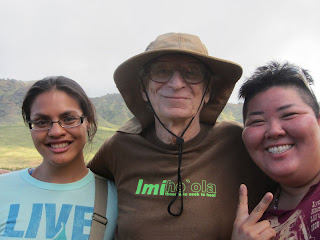Day 1 and we have already separated. While my Hawai‘i sisters were rising and dressing to march
in solidarity with Puerto Ricans protesting their governor’s endorsement of an
underwater pipeline to bring in more fossil fuel from the United States, I
awoke from my first morning in Puerto Rico in the hills of Aibonito.
Aibonito comes from an old Taino name, Hatibonito. The drive is long and windy, like the road to
Kahukūloa, but inland through the mountains, like the road to Big Bear. It’s peppered with little villages along the
way, and cold increases with the altitude, as if you’re going to Volcano. It also has a river called Cojonesdos, which
poetically translates to “home,” but literally means “testicles.”Aibonito is where Ornellia Perez lives, and where I spent Saturday night. Breakfast was 2 eggs laid by the neighbor’s hens, salad greens, toast with sunflower seed spread, orange-carrot juice, Puerto Rican coffee, and a view of the ocean. Muy delicioso.
 Ornellia had an opportunity to fill in for the regular host
of radio talk show called Canto Libre,
Freedom Song, and promote the conference in which I’ve come to Puerto Rico
to participate. Others were committed to
march in old San Juan, but willing to call in to the show. As the primary language is Spanish, I couldn’t
really have a big role with the radio program, but thirteen years in Hawai‘i talk
radio should’ve enabled me to kōkua
some of the technical aspects, or help develop the program.
Ornellia had an opportunity to fill in for the regular host
of radio talk show called Canto Libre,
Freedom Song, and promote the conference in which I’ve come to Puerto Rico
to participate. Others were committed to
march in old San Juan, but willing to call in to the show. As the primary language is Spanish, I couldn’t
really have a big role with the radio program, but thirteen years in Hawai‘i talk
radio should’ve enabled me to kōkua
some of the technical aspects, or help develop the program. We drove an hour-and-a-half to Ponce (POHN-seh) in the south of La Isla Grande, the main island. Ponce people are like Texans, claiming everything is bigger there, always trying to outdo non-Ponceians. The welcome sign upon entering the township is 5 huge letters spread out across the road.
Ornellia had developed an outline for the 90 minute program, and we dove right in.
Ornellia introduced herself and the important work she does with women at Centro Mujer y Nueva Familia in Baranquitas where she works. Immediately, the president of her board of directors called in to report on the march in which our IWNAM sisters were participating. We also had call-in interviews with María Reinat-Pumarejo (Puerto Rico), Terri-Lee Keko‘olani (Hawai‘i) and Aida F. Santos-Maranan (Philippines). All three were able to provide historical context to today’s movement, and their activities.
Ornellia did a beautiful job reviewing the materials from across the years with International Women's Network against Militarism. We threw in a few songs by Korean singer Ahn Hea Kyong: Warrior, Uno and others. And we closed with a beautiful poem by David Whyte, first in English and then translated to Spanish. Following this call-in show, an elderly man called in to tell us to tell all the women that the work is so important, that everyone in his family has cancer. He was crying.
Here's the poem.
Sweet Darkness
When your eyes are tired
the world is tired also.
the world is tired also.
When your vision has gone
no part of the world can find you.
no part of the world can find you.
Time to go into the dark
where the night has eyes
to recognize its own.
where the night has eyes
to recognize its own.
There you can be sure
you are not beyond love.
you are not beyond love.
The dark will be your womb
tonight.
The night will give you a horizon
further than you can see.
further than you can see.
You must learn one thing.
The world was made to be free in.
The world was made to be free in.
Give up all the other worlds
except the one to which you belong.
except the one to which you belong.
Sometimes it takes darkness and the sweet
confinement of your aloneness
to learn
confinement of your aloneness
to learn
anything or anyone
that does not bring you alive
is too small for you.
is too small for you.



 “Rather than building up for war, we could be working toward peace,” Fred Dodge, MD, co-founder of Mālama Mākua.
“Rather than building up for war, we could be working toward peace,” Fred Dodge, MD, co-founder of Mālama Mākua.













